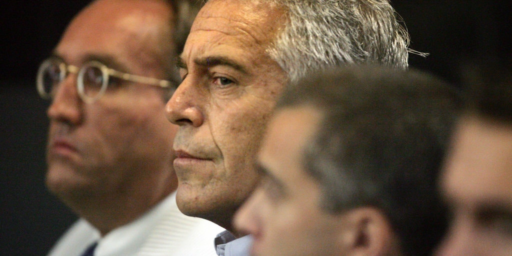DEATH MARKET III
I find it mildly amusing that the chattering about the terrorism futures market is lasting far longer than the market itself.
Daniel Gross has a piece in Slate in which he observes that it isn’t a nutty idea on its face,
But the prospect of such an exchange raised several troubling questions. Set aside for a moment the cognitive dissonance of a conservative, faith-based administration using government-sponsored gambling to set policy. And forget that the market represented an effort to meld two secretive cultures that have been discredited for their recent catastrophic failures–Wall Street securities analysis and Washington intelligence analysis.
Heh. Hadn’t thought of it that way.
More important, a havoc market wouldn’t benefit from the rationality that regular financial markets require. By and large, markets for futures–as well as stocks and bonds–are presumed to be efficient and rational, Internet bubble notwithstanding. This collective rationality is precisely what the Pentagon was hoping to harness by creating a market for geopolitical events.
But in the Middle East, many of the figures who would have driven the pricing of PAM securities are not what international relations types refer to as “rational actors.” Suicide bombers almost by definition are irrational, or at least not governed by a rationality with which we are familiar. We routinely refer to the main players with terms that place them beyond the field of reason–Saddam Hussein is “the Butcher of Baghdad,” Osama Bin Laden is a “madman.”
This simply isn’t true. Based on their value and belief systems, suicide bombers are maximizing their utility exponentially. Martyrdom, riches for their family from the Saudis, and a fast track to the great beyond to be greeted with 72 virgins raisins beats the hell out of their status quo.
Ronald Bailey, writing in Reason, interviews George Mason University economics professor Robin Hanson, who is the originator of this idea. He manages to answer most of the objections about the program. Bailey concludes,
In the end, a promising research program that might have enhanced U.S. intelligence gathering was killed off by cheap moral posturing on the part of a couple of U.S. Senators. Who’s incredibly stupid now?
Indeed. But this is yet another case (TIPS being the most obvious previous example) of a potentially useful program being killed because the geniuses behind it decided to play cloak and dagger with it rather than being up front. Had they approached it differently–and come up with a better name–they might have headed off the objections at the pass.






I read Gross’ piece last night and his misuse of the term “rational actor” struck me as a freshman political science mistake. Moreover, the overly negative reaction to the futures issue in the press also makes me think that nobody — and I mean nobody — actually bothered to talk to people with a poli sci or econ background before frothing about FutureMAP/PAM. Although, on the plus side, I’ll be able to cite this episode to colleagues next time I get into a debate about “reactionary Republicans.”